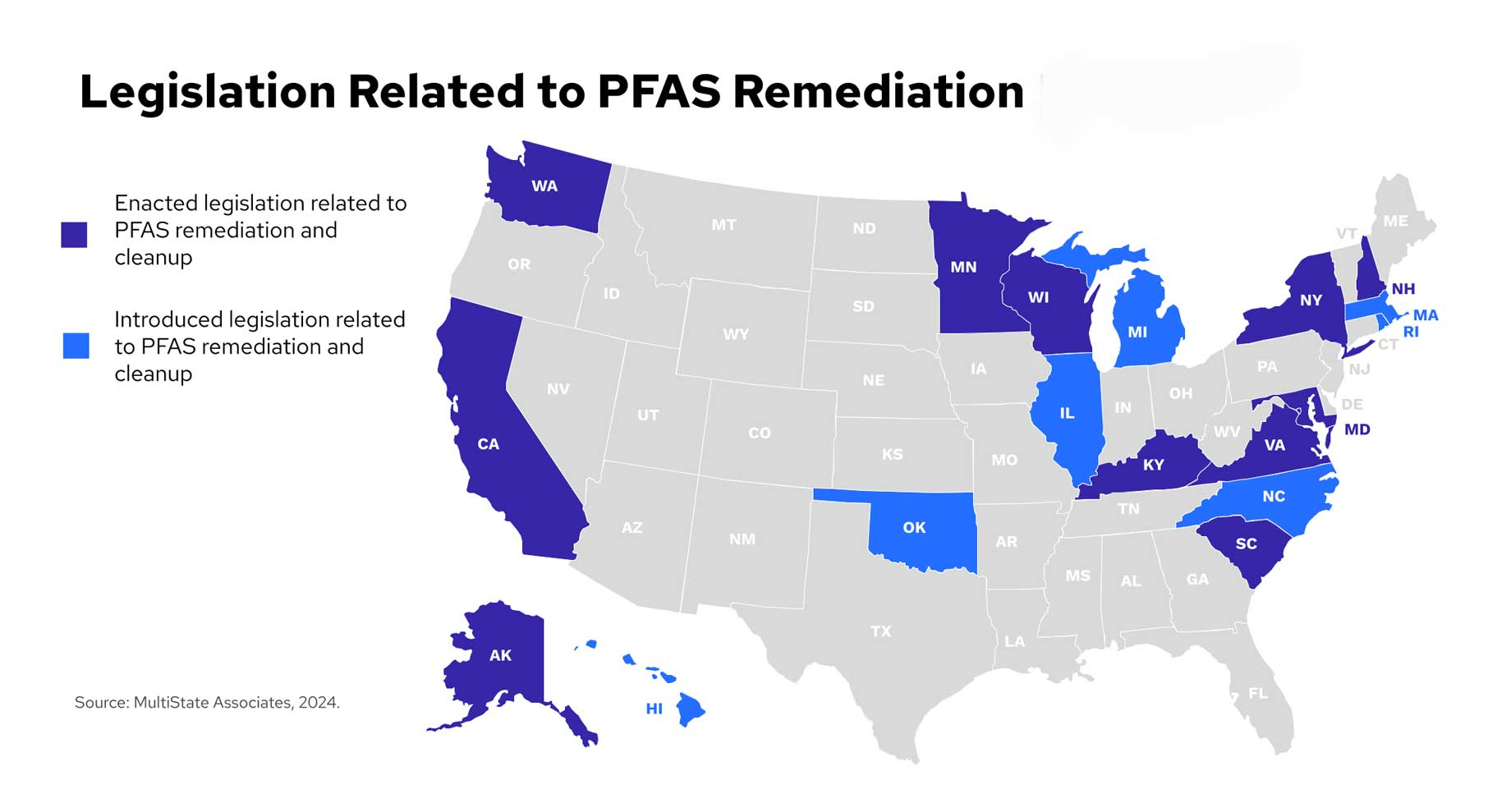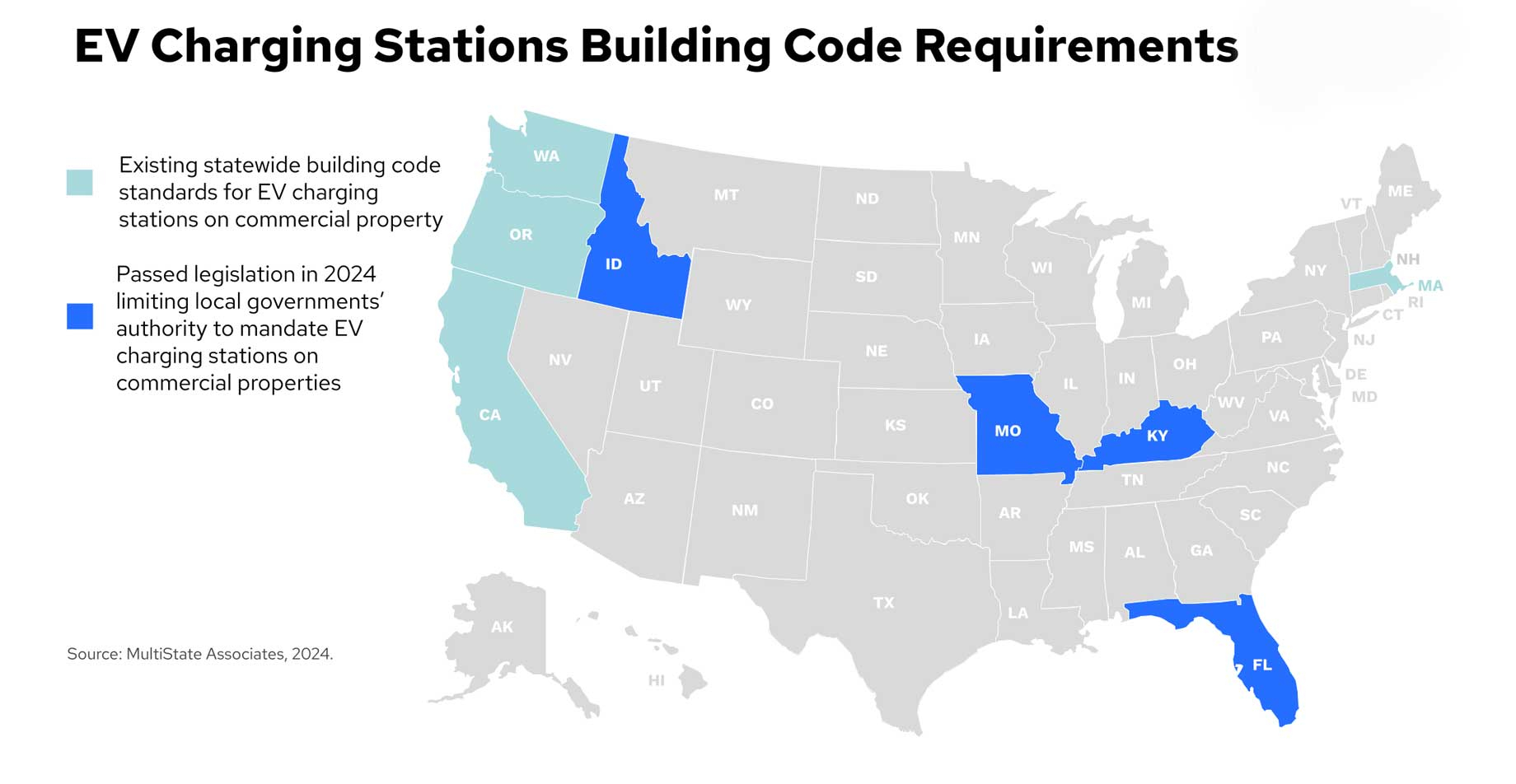Environmental and climate-related issues have been a major topic of conversation for state lawmakers in recent years. From regulating EV charging infrastructure to PFAS remediation, state lawmakers have been on the front lines of advancing a range of environmental-based policies that impact commercial property owners. Below are some high-level trends that occurred in states this year on environmental issues.
States Increase Funding for PFAS Remediation
Efforts to clean up a collection of “forever chemicals” — known as perfluoroalkyl and poly-fluoroalkyl substances (PFAS) — have been increasing. The endless life of these chemicals and their potential impact on the health of humans and the environment has prompted some lawmakers to draft legislation that shifts the burden of cleanup to not just producers of products that contain PFAS, but also other supply chain participants such as retailers and, in some cases, property owners.
This year, 35 bills were introduced in 15 states related to PFAS remediation. Most bills addressing PFAS either direct funding to be used for cleaning up or for developing PFAS monitoring and testing protocols. New Hampshire Governor Chris Sununu (R) signed legislation (NH HB 1114) to extend the study of environmental and public health impacts relating to releases of perfluorinated chemicals in the air, soil, and groundwater. Meanwhile, several states including Washington (WA SB 5949), New York (NY AB 8804), Wisconsin (WI SB 70), Minnesota (MN HF 4124), Alaska (AK SB 187), South Carolina (SC HB 5100), Michigan (MI SB 767) and California (CA SB 867) included funding for PFAS remediation projects in their enacted budgets and appropriations bills in the 2024 session.
Looking ahead to 2025, lawmakers are expected to introduce more legislation on issues such as PFAS in consumer products and general remediation. States may also be considering bills that establish study committees to dive deeper into remediation and the effects of PFAS on public health and the environment.

Extended Producer Responsibility (EPR) for Packaging
One proposed solution to deal with the growing issue of plastic waste is extended producer responsibility (EPR) for packaging programs. These programs are designed to shift the responsibility and cost burden of recycling from local governments to private industry. Under an EPR packaging program, producers and sellers of packaging materials pay fees into a designated producer responsibility organization (PRO) as a way to encourage the use of more sustainable packaging and invest in new recycling processes that promote circularity. With the federal government slow to act on the issue, states have taken the lead in advancing their own EPR packaging programs resulting in a growing patchwork of complex state programs.
This year, Minnesota became the fifth state to enact an EPR packaging law (HF 3911), the first state to do so since 2022. Lawmakers in New York state were able to rush an EPR packaging bill (NY SB 4246) through the Senate near the end of the session, but the bill ultimately failed in the House. Additional bills were introduced in Hawaii, Illinois, Massachusetts, Michigan, North Carolina, New Hampshire, New Jersey, Rhode Island, Tennessee and Washington, but those bills were not signed into law.
Next year, recycling policy experts anticipate legislative activity in Washington, New Jersey and New York on EPR packaging. Minnesota’s recently enacted law is more producer-friendly than the programs in California, Maine and Oregon. Industry groups are supportive of EPR programs that give operational control to private industry with government oversight, a concept that usually lacks support from environmental advocates and NGOs who are more inclined to support state-run EPR programs. More major retail brands are expected to weigh in on the issue in 2025.
Republican States Preempt Local Control Over EV Charging Station Mandates
State and local lawmakers play a critical role in creating rules and standards for publicly available EV charging stations. Many cities such as Seattle and Oakland have set building code requirements that mandate at least 10% of commercial parking lots be EV-ready, while places like San Jose, California require 10% of parking spots to have EV charging stations fully installed.
Three states — Florida (FL SB 1084), Kentucky (KY HB 581) and Missouri (MO HB 2062) — enacted legislation in 2024 to limit local authority over setting public charging station requirements. The Idaho House passed similar legislation (ID HB 704) this year, but the bill failed to make it to the Governor’s desk. These measures, while not the first examples of local preemption, could mark the beginning of a national trend that positions some states against their local governments in setting rules for EV charging stations on commercial properties.
